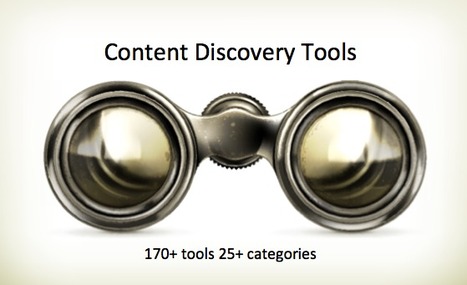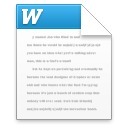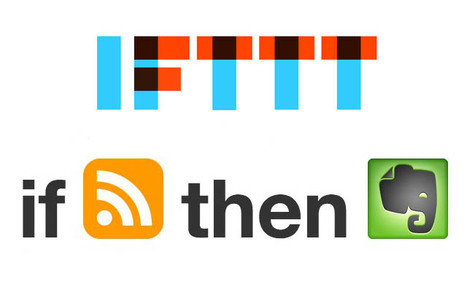One of the most fun and useful things I’ve been doing lately is automating small processes I do all the time. It took me a while to work up the courage to dive into automation, as it always seemed like a really difficult, technical thing to do, which should be left to programmers. Luckily, there [...]
Get Started for FREE
Sign up with Facebook Sign up with X
I don't have a Facebook or a X account
 Your new post is loading... Your new post is loading...
 Your new post is loading... Your new post is loading...

Peter Skillen's curator insight,
February 19, 2014 8:05 AM
I love this distinction. NCTE's notion of ''managing multiple streams of information' makes sense when viewed as multiplexing. People have been interpreting this as multitasking - and this has been grossly incorrect in my opinion

Jeff Domansky's curator insight,
October 3, 2014 10:54 AM
Robin Good has done a phenomenal job of gathering content discovery tools and putting them into categories for easy search and even easier use. 
Roberto De Pedrini (Telnext - Italy) - Twitter: @depetwi's curator insight,
October 4, 2014 2:39 AM
This is an Off-Topic but interesting !

Antonio Lopez's comment,
December 20, 2013 10:09 AM
Thanks Howard. I always wondered shy Apple didn't have something like this already. This will be a life saver!

David McGavock's curator insight,
December 22, 2013 1:34 PM
If you use copy - paste often (I certainly do), you know how often you'd like to paste an older item. Here ya go.

David McGavock's curator insight,
December 9, 2013 6:19 PM
Howard has been interrogating digital phenomena for decades. More good insights.

Kma Technoware's curator insight,
September 30, 2013 12:56 AM
i like changes in google search eninge..........http://www.kmatechnoware.com 
Ken Morrison's curator insight,
October 2, 2013 7:52 PM
I went to a Google Apps For Education Summit last weekend. They did not say much about these changes, but interesting ideas were shared among participants.

Ra-eesah Mohamed's curator insight,
October 2, 2013 9:38 AM
writing faster in class is a constant battle in lectures then learning how to write faster seems like a legit tool to use in everyday life.
|

David McGavock's comment,
February 6, 2014 2:24 PM
Thanks Howard! looks like a great tool for my purposes

David McGavock's curator insight,
February 6, 2014 2:26 PM
Not a basic tool necessarily but a great tool if you want to link various social media engines.

Louise Robinson-Lay's curator insight,
December 31, 2013 9:43 PM
This blog goes through how to manage the huge amounts of information coming in each moment through our digital channels. The author shares her personal knowledge management routine. 
CIE San Diego's curator insight,
January 1, 2014 7:28 PM
Helpful way to structure what we each do more informally 
Patricia Baker's curator insight,
February 15, 2014 6:33 PM
Could be a quick research tip for students: seek, sense, share.

David McGavock's curator insight,
December 22, 2013 2:28 PM
The benefit of Evernote is realized by it's availability on all of your communication devices. It's great to have help when you are operating on the smaller interface.

Peter Skillen's curator insight,
February 19, 2014 8:22 AM
I like Howard Rheingold's comment about this article. "I have one very small but very important difference with the thesis of this article. Where the author says "we can't expect them to develop their attention by reading 140-character tweets..." I would insert the word "just," as in "we can't expect them to develop their attention just by reading 140-character tweets..." Attention and attentional skills are vulnerable and trainable along a spectrum of infotentional situations. And 18 minute videos about big ideas are a legitimate form of cultural expression, with a legitimate place on that spectrum. Where I do agree with the author is with his main prescription -- yes, I require my students to blog and tweet. I also expect them to spend hours each week reading longer and often considerably complex texts."
I agree that we need to focus on developing these attention skills - not just in school - but also in positive 'out of school' circumstances. I think of some of the individual sports in which I have been involved - either directly or through family members. As an avid rock climber in earlier days, I used to reflect on how in the 'zone' I could be - just how I could enter that 'state of flow' that Mihaly Csikszentmihalyi espouses. I needed to very much 'attend' to the task at hand - not just for obvious reasons of safety! In fact, the more I attended to the rockwall problem in front of me, the more successful I was in achieving the climb. If I let my attention wander, then success often eluded me. (Mihaly would likely agree with me on this one - as he was also a climber in his younger days!)
Rigorous work or play exercises the attention muscle. Go for it. |

































Get some handy tips on how to automate every day tasks with online tools.